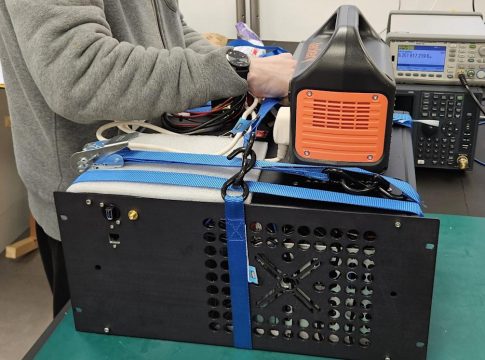A Revolutionary Leap in Timekeeping: The AQlock for the Royal Navy
In a groundbreaking development for maritime navigation, the Royal Navy is deploying a novel timekeeping device designed to combat vulnerabilities associated with satellite-based systems. Meet the AQlock, a state-of-the-art atomic clock that promises to redefine how the Navy—and potentially other sectors—manage time and navigation at sea.
What Sets AQlock Apart?
Traditionally, naval vessels have relied on Global Navigation Satellite Systems (GNSS) to keep accurate time, a crucial component of navigation. However, GNSS signals are susceptible to jamming and spoofing—threats where malicious actors interfere with or mimic satellite signals to confuse systems. AQlock steps in as a robust alternative, ensuring secure and reliable timekeeping without the risks associated with distance-based satellite technology.
Key Features:
-
Ground-Based Technology: Unlike conventional atomic clocks that are often stationed in satellites orbiting around 20,000 km away, the AQlock operates close to the vessel itself. This proximity not only enhances accuracy but also significantly reduces the risk of signal jamming.
-
Advanced Atomic Measurements: The AQlock stabilizes its clock by comparing the ticking frequency to the properties of cooled atoms. Specifically, these atoms are kept at an ultra-low temperature of -273.15°C, enabling precise measurement and stable timekeeping.
- Field-Ready Performance: Having successfully operated aboard HMS Pursuer for three consecutive days under challenging sea conditions, the AQlock demonstrates its ruggedness and reliability in real-world applications.
Pros and Cons
Pros:
-
Improved Security: By minimizing reliance on GNSS, the AQlock reduces vulnerabilities associated with satellite navigation.
- High Precision: The cooling mechanism used to stabilize the clock enhances timekeeping accuracy, making it less prone to errors compared to traditional systems.
Cons:
-
Integration with Existing Systems: Transitioning to a new technology may pose challenges in terms of integrating with established naval systems.
- Initial Cost: The advanced technology used in the AQlock may come with a higher price point compared to traditional timekeeping mechanisms, though specifics about pricing have yet to be disclosed.
Key Takeaways
The AQlock by Aquark Technologies is not just another gadget; it represents a pivotal advancement in timekeeping technology for the Royal Navy. As Dr. Alex Jantzen, CEO of Aquark Technologies, articulates, it serves as a potential antidote to the challenges posed by spoofing and jamming. By maintaining operations close to the point of activity, the clock has set a new standard for securing timekeeping in critical military operations.
Future Implications
This innovation is more than just a win for the Navy; it opens up avenues for various sectors, including telecommunications, finance, and transportation, all of which rely heavily on accurate positioning and timing. As studies and trials continue, the AQlock may well usher in a new era of secure navigation not only for defense but for commercial applications too.
In a world increasingly dependent on advanced technology for safety and efficiency, the AQlock stands as a testament to how innovation can tackle emerging threats in an ever-evolving landscape.

Writes about personal finance, side hustles, gadgets, and tech innovation.
Bio: Priya specializes in making complex financial and tech topics easy to digest, with experience in fintech and consumer reviews.

